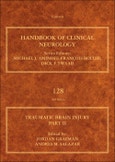The Handbook of Clinical Neurology volumes on Traumatic Brain Injury (TBI) provide the reader with an updated review of emerging approaches to TBI research, clinical management and patient rehabilitation. Chapters in Part II offer coverage of clinical sequelae and long-term outcome, brain plasticity and long-term risks, and clinical trials. Contemporary investigations on blast injury and chronic traumatic encephalopathy are presented, making this state-of-the-art volume a must have for clinicians and researchers concerned with the clinical management, or investigation, of TBI.
Please Note: This is an On Demand product, delivery may take up to 11 working days after payment has been received.
Table of Contents
Section 6 Clinical Sequelae and Long-Term Outcome 29. Predicting Outcome after Traumatic Brain Injury 30. Movement disorders secondary to craniocerebral trauma 31. Language impairments in traumatic brain injury: a window into complex cognitive performance 32. Connecting clinical and experimental investigations of awareness in traumatic brain injury 33. Post-Traumatic Epilepsy 34. Autonomic Dysfunction Syndromes after Acute Brain Injury 35. Sleep in traumatic brain injury 36. Post traumatic headaches 37. Traumatic brain injury and cognition 38. Mood disorders 39. Post-traumatic stress disorder and traumatic brain injury 40. Long term functional outcomes and psychosocial consequences of traumatic brain injury 41. Sequelae in Children: Developmental Consequences
Section 7 Brain Plasticity and Long-Term Risks 42. Cellular and Molecular Neuronal Plasticity 43. Traumatic brain injury and reserve 44. Traumatic brain injury and late-life dementia 45. Genetic factors in traumatic brain injury
Section 8 Conducting Clinical Trials in Traumatic Brain Injury 46. Ethical and Regulatory Considerations in the Design of Traumatic Brain Injury Clinical Studies 47. Design of Acute Neuroprotection Studies 48. Design of brain injury rehabilitation treatment research 49. The ebb and flow of traumatic brain injury research








